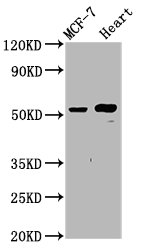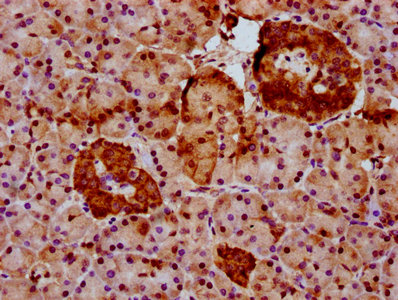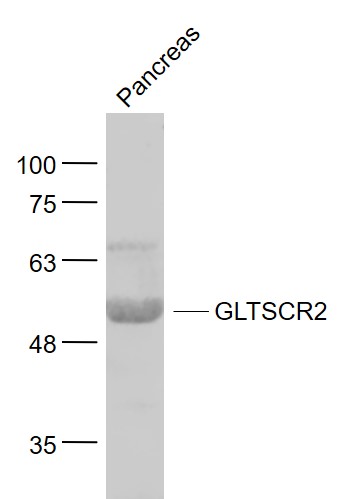
Western Blot Positive WB detected in: MCF-7 whole cell lysate, Rat heart tissue All lanes: NOP53 antibody at 4.8ug/ml Secondary Goat polyclonal to rabbit IgG at 1/50000 dilution Predicted band size: 55 kDa Observed band size: 55 kDa
NOP53 Antibody
CSB-PA885778LA01HU
ApplicationsWestern Blot, ELISA, ImmunoHistoChemistry
Product group Antibodies
ReactivityHuman, Rat
TargetNOP53
Overview
- SupplierCusabio
- Product NameNOP53 Antibody
- Delivery Days Customer20
- ApplicationsWestern Blot, ELISA, ImmunoHistoChemistry
- CertificationResearch Use Only
- ClonalityPolyclonal
- ConjugateUnconjugated
- Gene ID29997
- Target nameNOP53
- Target descriptionNOP53 ribosome biogenesis factor
- Target synonymsGLTSCR2, PICT-1, PICT1, ribosome biogenesis protein NOP53, glioma tumor suppressor candidate region gene 2 protein, p60, protein interacting with carboxyl terminus 1
- HostRabbit
- IsotypeIgG
- Protein IDQ9NZM5
- Protein NameRibosome biogenesis protein NOP53
- Scientific DescriptionNucleolar protein which is involved in the integration of the 5S RNP into the ribosomal large subunit during ribosome biogenesis (PubMed:24120868). In ribosome biogenesis, may also play a role in rRNA transcription (PubMed:27729611). Also functions as a nucleolar sensor that regulates the activation of p53/TP53 in response to ribosome biogenesis perturbation, DNA damage and other stress conditions (PubMed:21741933, PubMed:24120868, PubMed:27829214). DNA damage or perturbation of ribosome biogenesis disrupt the interaction between NOP53 and RPL11 allowing RPL11 transport to the nucleoplasm where it can inhibit MDM2 and allow p53/TP53 activation (PubMed:24120868, PubMed:27829214). It may also positively regulate the function of p53/TP53 in cell cycle arrest and apoptosis through direct interaction, preventing its MDM2-dependent ubiquitin-mediated proteasomal degradation (PubMed:22522597). Originally identified as a tumor suppressor, it may also play a role in cell proliferation and apoptosis by positively regulating the stability of PTEN, thereby antagonizing the PI3K-AKT/PKB signaling pathway (PubMed:15355975, PubMed:16971513, PubMed:27729611). May also inhibit cell proliferation and increase apoptosis through its interaction with NF2 (PubMed:21167305). May negatively regulate NPM1 by regulating its nucleoplasmic localization, oligomerization and ubiquitin-mediated proteasomal degradation (PubMed:25818168). Thereby, may prevent NPM1 interaction with MYC and negatively regulate transcription mediated by the MYC-NPM1 complex (PubMed:25956029). May also regulate cellular aerobic respiration (PubMed:24556985). In the cellular response to viral infection, may play a role in the attenuation of interferon-beta through the inhibition of DDX58/RIG-1 (PubMed:27824081).
- ReactivityHuman, Rat
- Storage Instruction-20°C or -80°C
- UNSPSC41116161





